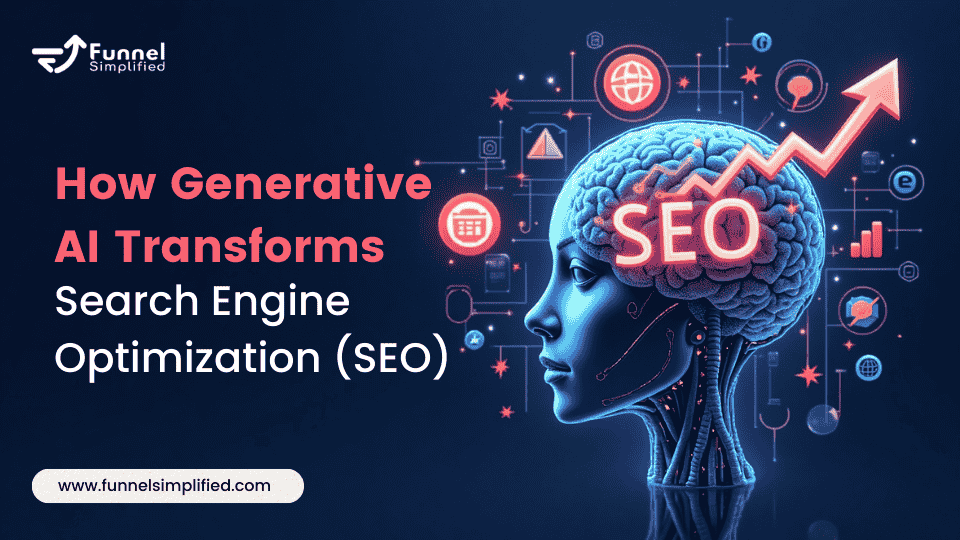
Digital marketers need to stay ahead of trends to remain competitive. Generative AI transforms how businesses approach search engine optimization (SEO). Automating tasks and delivering actionable insights helps marketers optimize strategies with precision. This article explains how generative AI enhances SEO and offers practical strategies to use it effectively.
What is Generative AI?
Generative AI uses advanced machine learning models to create content, analyze data, and automate processes. These models produce unique outputs based on the data they process, making them essential for creative and strategic tasks.
Key Technologies Behind Generative AI:
- GPT Models (Generative Pre-trained Transformers): These models excel at creating content and processing natural language.
- BERT (Bidirectional Encoder Representations from Transformers): BERT focuses on understanding the context of words in search queries.
- AI-Powered Platforms: Tools like Jasper and Wix AI simplify SEO tasks with user-friendly features.
These technologies improve efficiency and deliver SEO solutions tailored to user intent.
Content Creation at Scale
Generative AI’s ability to create content at scale makes it a valuable tool for SEO. It generates high-quality, engaging, and SEO-optimized content quickly.
How AI Produces SEO-Optimized Content:
- Generates Blog Posts and Articles: AI tools create structured content with target keywords and user-focused narratives.
- Creates Meta Content: AI generates optimized meta descriptions and title tags that improve click-through rates (CTR).
Case Study: A leading e-commerce site used AI-generated product descriptions. This approach reduced production time by 70% and increased organic traffic by 30%.
Best Practices:
- Combine AI-generated content with human creativity to ensure authenticity.
- Review and edit AI outputs to maintain consistency and align with your brand voice.
Enhancing Keyword Research and Strategy
Generative AI revolutionizes keyword research by analyzing large datasets and uncovering actionable insights.
AI-Powered Keyword Analysis:
- Identifies high-value keywords with low competition.
- Suggests long-tail keywords that match user intent and search patterns.
Data-Driven Insights: Generative AI tools analyze search trends and user behavior, helping marketers predict future keyword opportunities and refine their strategies.
Recommended Tools:
- SEMrush and Ahrefs: Both platforms offer AI features for more intelligent keyword targeting.
- Google Keyword Planner: This tool uses AI to provide optimized keyword suggestions.
Personalizing the User Experience
Search engines prioritize user experience (UX), and generative AI is crucial in personalization. It tailors content delivery to boost engagement and satisfaction.
Why Personalization Matters:
- Personalized experiences increase user engagement and retention.
- Tailored content extends site visits and reduces bounce rates.
How Generative AI Personalizes Content:
- Suggest Dynamic Content: AI analyzes user behavior and recommends relevant articles, products, or services.
- Supports AI-Powered Chatbots: These tools provide real-time assistance, enhancing user interaction.
Example: Netflix’s recommendation system showcases how AI-driven personalization retains user interest and boosts engagement.
Optimizing Technical SEO
Technical SEO ensures search engines can crawl and index your site. Generative AI simplifies these tasks, improving site performance and visibility.
How AI Improves Site Performance:
- Detects and resolves issues like slow page load times, crawl errors, and duplicate content.
- Recommends fixes to enhance rankings.
Streamlines Internal Linking: Generative AI evaluates site structures and suggests logical internal links, improving navigation for users and search engines.
Prepares for Voice Search: AI tailors content to match conversational queries, focusing on long-tail keywords and natural language for better voice search results.
Adapting to Algorithm Changes
Search engine algorithms change frequently, and generative AI helps marketers stay ahead by adapting strategies quickly.
How AI Handles Algorithm Updates:
- Tracks algorithm changes in real-time.
- Suggests content adjustments to maintain compliance and performance.
Example: When Google prioritized mobile-first indexing, an AI tool helped a retail brand optimize its mobile site. This strategy retained rankings and prevented traffic loss.
Advanced Analytics and Performance Tracking
Generative AI enhances analytics by offering detailed user behavior and content performance insights.
How AI Delivers Insights:
- Analyzes traffic patterns, bounce rates, and conversion metrics.
- Pinpoints underperforming pages and suggests improvements.
Refining Strategies with Analytics:
- Predictive analytics forecast trends and outcomes, enabling proactive adjustments.
- Continuous optimization ensures a better return on investment (ROI).
Example: An AI-driven platform helped a travel website identify seasonal trends. By adjusting its content calendar, the site increased traffic by 25% during peak seasons.
Ethical Considerations and Limitations
Marketers must use generative AI responsibly and recognize its limitations.
Maintaining Balance:
- Avoid over-relying on AI to prevent generic or low-quality outputs.
- Use human oversight to ensure originality and relevance.
Addressing Risks:
- Watch for plagiarism and repetitive content.
- Ensure AI-generated content aligns with your brand tone and user expectations.
Best Practices:
- Use AI as a supplementary tool, not a complete replacement.
- Regularly audit AI-generated content for quality and compliance.
Conclusion
Generative AI reshapes SEO by automating tasks, delivering insights, and personalizing user experiences. Its applications, from scalable content creation to predictive analytics, empower businesses to stay competitive. However, achieving the best results requires blending AI capabilities with human expertise.




